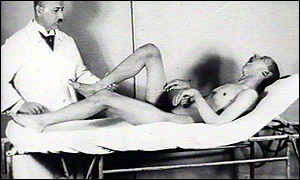RandomPoster
Platinum Member
- May 22, 2017
- 2,584
- 1,792
- 970
Were a lot of the victims of the 1918 flu epidemic literally drowning in their own mucus and blood?
The 1918 Spanish Flu Pandemic That Killed Millions
"The victims of the 1918 Spanish flu suffered greatly. Within hours of feeling the first symptoms of extreme fatigue, fever, and headache, victims would start turning blue. Sometimes the blue color became so pronounced that it was difficult to determine a patient's original skin color.
The patients would cough with such force that some even tore their abdominal muscles. Foamy blood exited from their mouths and noses. A few bled from their ears. Some vomited; others became incontinent.
The Spanish flu struck so suddenly and severely that many of its victims died within hours of coming down with their first symptom. Some died a day or two after realizing they were sick."

The 1918 Spanish Flu Pandemic That Killed Millions
"The victims of the 1918 Spanish flu suffered greatly. Within hours of feeling the first symptoms of extreme fatigue, fever, and headache, victims would start turning blue. Sometimes the blue color became so pronounced that it was difficult to determine a patient's original skin color.
The patients would cough with such force that some even tore their abdominal muscles. Foamy blood exited from their mouths and noses. A few bled from their ears. Some vomited; others became incontinent.
The Spanish flu struck so suddenly and severely that many of its victims died within hours of coming down with their first symptom. Some died a day or two after realizing they were sick."


